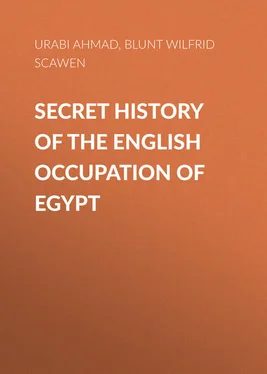Wilfrid Blunt - Secret History of the English Occupation of Egypt
Здесь есть возможность читать онлайн «Wilfrid Blunt - Secret History of the English Occupation of Egypt» — ознакомительный отрывок электронной книги совершенно бесплатно, а после прочтения отрывка купить полную версию. В некоторых случаях можно слушать аудио, скачать через торрент в формате fb2 и присутствует краткое содержание. Жанр: foreign_antique, foreign_prose, Историческая проза, на английском языке. Описание произведения, (предисловие) а так же отзывы посетителей доступны на портале библиотеки ЛибКат.
- Название:Secret History of the English Occupation of Egypt
- Автор:
- Жанр:
- Год:неизвестен
- ISBN:нет данных
- Рейтинг книги:4 / 5. Голосов: 1
-
Избранное:Добавить в избранное
- Отзывы:
-
Ваша оценка:
- 80
- 1
- 2
- 3
- 4
- 5
Secret History of the English Occupation of Egypt: краткое содержание, описание и аннотация
Предлагаем к чтению аннотацию, описание, краткое содержание или предисловие (зависит от того, что написал сам автор книги «Secret History of the English Occupation of Egypt»). Если вы не нашли необходимую информацию о книге — напишите в комментариях, мы постараемся отыскать её.
Secret History of the English Occupation of Egypt — читать онлайн ознакомительный отрывок
Ниже представлен текст книги, разбитый по страницам. Система сохранения места последней прочитанной страницы, позволяет с удобством читать онлайн бесплатно книгу «Secret History of the English Occupation of Egypt», без необходимости каждый раз заново искать на чём Вы остановились. Поставьте закладку, и сможете в любой момент перейти на страницу, на которой закончили чтение.
Интервал:
Закладка:
Having completed his studies in 1870, and being then thirty-two years old, he passed through India to Bombay and joined the pilgrimage to Mecca, and, this duty accomplished, he came on to Cairo and afterwards to Constantinople. He remained on this first visit no more than forty days in Egypt, but he had time to make acquaintance with certain of the Azhar students and to lay the foundations of the teaching he afterwards developed. At Constantinople his great eloquence and learning soon asserted itself, and he was given a position in the Anjuman el Elm , where he lectured on all subjects, his knowledge being almost universal. He had great quickness of intellect and an astonishing memory, so that it is said of him that he could read a book straight off on any subject and master the whole contents as inscribed upon his mind forever. Beginning with grammar and science, his lectures went on to philosophy and religion. He taught that Sunnite Islam was capable of adapting itself to all the highest cravings of the human soul and the needs of modern life. As an orthodox Sunni, and with the complete knowledge he had of the hawadith , he was listened to with respect and soon got a following among the younger students. He inspired courage by his own boldness, and his critical treatment of the received commentaries, even those of El Hánafi, was accepted by them as it would hardly have been from any other. Their consciences he was at pains to free from the chains in which thought had lain for so many centuries, and to show them that the law of Islam was no dead hand but a system fitted for the changing human needs of every age, and so itself susceptible of change. All this stood in close analogy to what we have seen of the re-awakening of the Christian intellect during the fifteenth and sixteenth centuries in Europe and its adaption of orthodox doctrines to the scientific discoveries of the day. It is strange, however, that in Western Islam the new spirit of criticism should have been initiated as it was, by one whose education had been made in such unprogressive lands as those of Central Asia, and at a university so far away.
Sheykh Jemal-ed-din's career at Constantinople was a brilliant but a short one. He was essentially a free lance, and, like most Afghans, a disregarder of persons and of those ceremonial observances which regulate among the Ottoman dignitaries the personal intercourse of the great with those who attend their levées. Although protected by certain of the Liberal Statesmen, and notably by Ali and Fuad Pashas, who saw in his teaching a support to their unorthodox political reforms against the old-fashioned Ulema, Jemal-ed-din had managed to give offence to the high religious authorities, and especially by his independent personal attitude to the Sheykh el Islam, and these soon found in his lectures matter for reproof and condemnation. Advantage was taken of certain passages in his lectures to denounce him to the Government as an atheist and a perverter of the law, and when the Afghan reformer had replied by a courageous demand to be confronted with his high accusers and heard in a public discussion the official sense of propriety was shocked and alarmed. The challenge was producing an immense excitement among the Softas, the younger of whom were all on Jemal-ed-din's side, and the quarrel seemed likely to lead to serious trouble. Notice was somewhat reluctantly given that he had better leave once more for Egypt and the Holy Places. It was thus under the cloud of religious persecution that he returned to Cairo, but not without having sown the seed of inquiry which was to mature some years later at Constantinople in the shape of a general demand among the Softas for constitutional reform. It was the religious part of the movement which was to culminate in the political revolution attempted by Midhat Pasha in 1876.
At the Azhar, when he returned to Cairo in 1871, Jemal-ed-din's reputation had of course preceded him, and, though Egypt was then in the darkest night of its religious unintelligence, for the moral corruption of the Government, especially in Ismaïl's reign, had infected all classes and had extinguished every tradition of courage and independence among the Ulema, considerable curiosity was felt about him. The few friends he had made on the occasion of his first visit welcomed him, if not openly, in secret, and presently the wonderful fire and zeal of his conversation drew around him, as it had done at Constantinople, a group of young and enthusiastic followers. The most remarkable of these, his earliest disciples at the Azhar, were Sheykh Mohammed Abdu, who was to play so important a part in public affairs later and who is now Grand Mufti of Egypt, and Sheykh Ibrahim el Aghani the well-known publicist. To these he was able to communicate without reserve his stores of varied knowledge, and to inspire them with his critical spirit and something of his courage. Courage indeed was needed in those days for any man at Cairo to speak out. Ismaïl brooked no kind of opposition and wielded power so absolute in the country that independent speech, almost independent whispering, had disappeared from men's mouths. It was only the fellahin of the village, already despoiled of all, that dared complain, or those in the city too poor and insignificant to be of any political count. The highest religious authorities, as well as the highest officials, had long been silent about injustice and had chosen their part of acquiescence, content so long as they could get their share, each one however small, of the general plunder.
On this dark state of intellectual and moral things Jemal-ed-din's courageous teaching broke like an apparition of strange light, and his very courage for awhile secured him a hearing undisturbed by admonition from the Government. Perhaps his quarrel at Constantinople was a passport to Ismaïl's tolerance, perhaps he deemed this Afghan too insignificant a force to call for suppression. Perhaps, like Ali and Fuad Pashas, he thought to turn the new teaching to account in his long war with the European Consuls. Be this as it may, Jemal-ed-din was allowed during the whole of the remaining years of Ismaïl's reign to carry on his lectures, and it was only on Tewfik's accession and the establishment of the Anglo-French condominium that he was arrested on an executive order, sent untried to Alexandria, and summarily exiled. He had, however, already done his work, and at the time of which I am writing his principles of Liberal reform upon a theological basis had so far prevailed at the Azhar that they had already been adopted by all that was intellectual there among the students. The reformer's mantle had fallen upon worthy shoulders, shoulders indeed it may be said, worthier even than his own. My little Arabic instructor, Mohammed Khalil, was never weary of speaking to me of the virtues and intellectual qualities of him who was now his spiritual master, Sheykh Mohammed Abdu, the acknowledged leader at the Azhar, in Jemal-ed-din's succession, of the Liberal Party of reform.
I find a note among my papers that it was on the 28th of January, 1881, that I was first taken by my enthusiastic Alem to Mohammed Abdu's little house in the Azhar quarter, a day to be marked by me with an especially white stone, for it began for me a friendship which has lasted now for nearly a quarter of a century with one of the best and wisest, and most interesting of men. When I use these words of him it must not be thought that they are light or exaggerated judgment. I base them on a knowledge of his character gained in a variety of circumstances on very difficult and trying occasions, first as a religious teacher, next as leader of a movement of social reform and as the intellectual head of a political revolution; again, as prisoner in the hands of his enemies, as exile in various foreign lands, and for some years under police surveillance at Cairo when his exile had been annulled; lastly, by the strength of his intellect and his moral character reasserting himself as a power in his own country, resuming his lectures at the Azhar, placed in the judicature, named Judge of Appeal, and finally, in these last days, Grand Mufti at Cairo, the highest religious and judicial position attainable in Egypt.
Читать дальшеИнтервал:
Закладка:
Похожие книги на «Secret History of the English Occupation of Egypt»
Представляем Вашему вниманию похожие книги на «Secret History of the English Occupation of Egypt» списком для выбора. Мы отобрали схожую по названию и смыслу литературу в надежде предоставить читателям больше вариантов отыскать новые, интересные, ещё непрочитанные произведения.
Обсуждение, отзывы о книге «Secret History of the English Occupation of Egypt» и просто собственные мнения читателей. Оставьте ваши комментарии, напишите, что Вы думаете о произведении, его смысле или главных героях. Укажите что конкретно понравилось, а что нет, и почему Вы так считаете.












